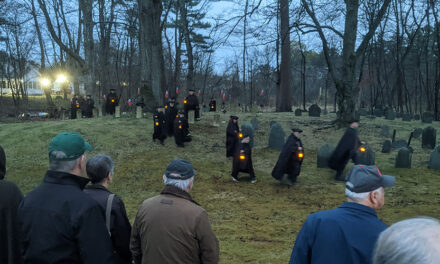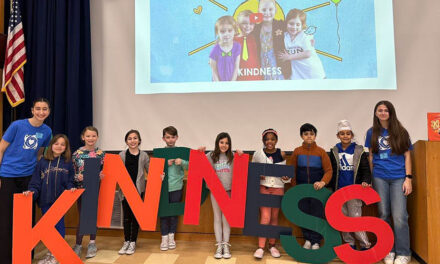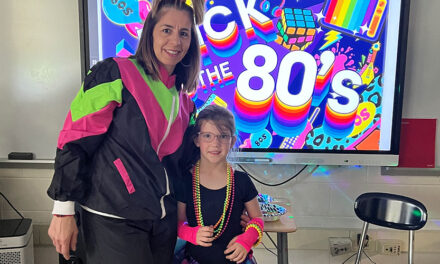Published in the October 25, 2017 edition
By DAN TOMASELLO
LYNNFIELD — The results from both the Legacy MCAS and the Next-Generation MCAS exams are in, and Lynnfield students performed well on both versions of the state test.
The Department of Elementary and Secondary Education (DESE) released the results of the Next-Generation MCAS exams taken by students in grades 3-8 last week. The state also released the results from the Legacy MCAS exam that was taken by high school students. Additionally, DESE released the results of the old MCAS science exam that was taken by both fifth and eighth graders.
“The MCAS results are in, and by all accounts, Lynnfield remains in excellent standing as a top district in the state,” said Superintendent of Schools Jane Tremblay in an email sent to parents. “There will be much conversation in the coming weeks regarding the results.”
A report on the revamped exam is included in this week’s Villager.
Tremblay noted the education website www.schooldigger.com ranked the school system and each school based on the results of the Legacy MCAS and Next-Generation MCAS exams. The school system as a whole was ranked 10th out of 334 districts. Summer Street School was ranked first out of 934 schools. Huckleberry Hill School was ranked 23rd out of 934 schools. Lynnfield Middle School was ranked 42nd out of 476 schools. Lynnfield High School was ranked 25th out of 340 schools.
“I look forward to in-depth discussions in the coming weeks as we begin the analysis of the data gaining an understanding of our strengths and weaknesses,” said Tremblay. “This information will guide us as we begin to understand this new test. I could not be more proud of the work that our teachers and administrators do on a daily basis for our students. Their continued dedication, commitment and passion are the foundation that makes our schools a special place for students to learn and grow.”
LHS results
While the state updated the MCAS exam for students in grades 3-8, Lynnfield High School students took Legacy MCAS exams this past spring. The state did not change the high school exams because passing the high stakes test is still a graduation requirement. Teaching and Learning Director Kevin Cyr said LHS students will begin taking the MCAS 2.0 exam in the spring of 2019.
The Legacy MCAS exam graded student performance using four different categories: Advanced, Proficient, Needs Improvement and Warning/Failing.
According to DESE, 75 percent of LHS sophomores were Advanced on the MCAS English exam while 22 percent were Proficient, 2 percent Needs Improvement and 1 percent failed.
On the MCAS math exam, 79 percent of sophomores were Advanced, 17 percent were Proficient, 2 percent Needs Improvement and 2 percent failed.
The data from DESE revealed 47 percent of high school freshmen received Advanced scores on the MCAS science exam while 47 percent were Proficient, 5 percent Needs Improvement and 1 percent failed.
According to a report from DESE that was obtained by the Villager, Lynnfield High School was one of seven high schools across the state that “will be commended for high achievement, making strong progress and/or narrowing proficiency gaps.” In addition to LHS, the other high schools are Swampscott High School, Westwood High School, Abington High School, Apponequet Regional High School in Lakeville, Blackstone Valley Regional High School in Upton and Minuteman Regional High School in Lexington.
Tremblay is pleased the high school was recognized in the wake of the MCAS exam being completely overhauled in grades 3-8.
“In the midst of all of this confusion, we really want to celebrate the high school because there were only seven high schools in the state that were recognized for academic excellence and closing the achievement gap,” said Tremblay. “There were only a few public high schools recognized and we were one of them.”
“It’s pretty impressive,” added Cyr.
Additional results
While Legacy MCAS exams taken by high school students mirrored exams taken in previous years, the Next-Generation MCAS is using a new grading system. The new exam evaluates students’ performance using four categories: Exceeding Expectations, Meeting Expectations, Partially Meeting Expectations and Not Meeting Expectations.
In the wake of DESE revamping the tests, DESE Acting Commissioner Jeff Wulfson said “the Next-Generation MCAS is a reformatted test” and this year’s results should not be compared to previous years.
The results revealed that 73 percent of students in grades 3-8 are Exceeding or Meeting Expectations on the MCAS 2.0 English exam. The data revealed 75 percent of students in grades 3-8 are Exceeding or Meeting Expectations on the Next-Generation MCAS math exam.
According to DESE, 32 percent of third graders are Exceeding Expectations, 53 percent are Meeting Expectations, 14 percent are Partially Meeting Expectations and 1 percent is Not Meeting Expectations on the MCAS 2.0 reading exam. On the math exam, 27 percent of third graders are Exceeding Expectations, 65 percent are Meeting Expectations, 7 percent are Partially Meeting Expectations and 2 percent are Not Meeting Expectations.
The fourth grade Next-Generation MCAS English exam results revealed 23 percent are Exceeding Expectations, 50 percent are Meeting Expectations, 26 percent are Partially Meeting Expectations and 2 percent are Not Meeting eExpectations. The MCAS 2.0 math exam’s results revealed 20 percent of fourth graders are Exceeding Expectations, 64 percent are Meeting Expectations, 14 percent are Partially Meeting Expectations and 2 percent are Not Meeting Expectations.
On the fifth grade Next-Generation MCAS English exam, 13 percent are Exceeding Expectations, 52 percent are Meeting Expectations, 35 percent are Partially Meeting Expectations and zero students are Not Meeting Expectations. The fifth grade MCAS 2.0 math exam’s results revealed 9 percent are Exceeding Expectations, 62 percent are Meeting Expectations, 29 percent are Partially Meeting Expectations and there are zero students Not Meeting Expectations.
Just to keep parents and school officials on their toes, fifth graders took the Legacy MCAS science exam because a new science test is in the midst of being developed for the fifth and eighth grades. The results revealed 31 percent of fifth graders were Advanced, 40 percent were pProficient, 26 percent Needs Improvement and 3 percent received a warning.
The results from the Next-Generation MCAS English exam revealed 5 percent of sixth graders are Exceeding Expectations, 70 percent are Meeting Expectations, 23 percent are Partially Meeting Expectations and 2 percent are Not Meeting Expectations. On the sixth grade MCAS 2.0 math exam, 10 percent of students are Exceeding Expectations, 64 percent are Meeting Expectations, 24 percent are Partially Meeting Expectations and 2 percent are Not Meeting Expectations.
According to the results from the seventh grade Next-Generation MCAS English exam, 13 percent are Exceeding Expectations, 58 percent are Meeting Expectations, 25 percent are Partially Meeting Expectations and 4 percent are Not Meeting Expectations. The seventh grade MCAS 2.0 math exam results revealed 15 percent are Exceeding Expectations, 51 percent are Meeting Expectations, 31 percent are Partially Meeting expectations and 3 percent are Not Meeting Expectations.
The results from the MCAS 2.0 English exam revealed 15 percent of eighth graders are Exceeding Expectations, 58 percent are Meeting Expectations, 25 percent are Partially Meeting Expectations and 3 percent are Not Meeting Expectations. On the Next-Generation MCAS math exam, 10 percent of eighth graders are Exceeding Expectations, 59 percent are Meeting Expectations, 27 percent are Partially Meeting Expectations and 3 percent are Not Meeting Expectations.
Similar to fifth grade students, eighth graders took the Legacy MCAS science exam as well. According to the results, 3 percent were Advanced, 55 percent were Proficient, 34 percent Needs Improvement and 8 percent received a warning.




